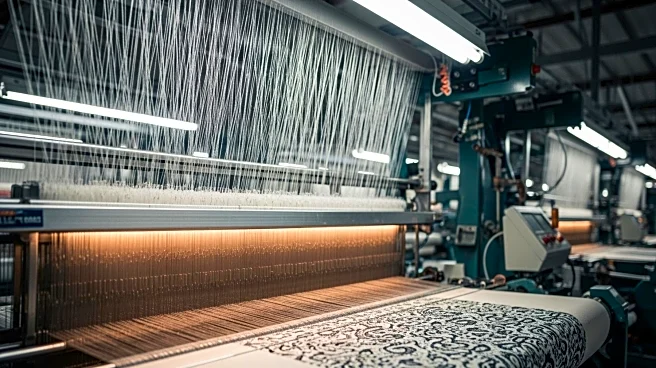What's Happening?
The U.S. textile industry is advocating for critical policy refinements to President Trump's 'America First' trade strategy, which aims to bolster American manufacturing. The industry, which employs over 470,000 workers and generates $64 billion in annual shipments, supports the administration's focus on restoring domestic manufacturing. However, it faces challenges due to reciprocal tariffs on imported inputs and machinery not available domestically, as well as punitive tariffs on trade from Western Hemisphere partners. These tariffs threaten the supply chains crucial to the textile sector, which is a key supplier to the U.S. Department of Defense and was instrumental during the COVID-19 pandemic. Industry leaders are concerned that these tariffs could lead to production downturns and plant closures, undermining U.S. manufacturing jobs and national security.
Why It's Important?
The textile industry's call for policy adjustments highlights the broader implications of trade policies on U.S. manufacturing and economic stability. The sector's reliance on imported materials and machinery underscores the interconnectedness of global supply chains. Tariffs that disadvantage domestic producers could inadvertently benefit foreign competitors, particularly in Asia, by weakening U.S. supply chains. This situation poses risks to national security, given the industry's role in supplying military gear. The proposed policy refinements, such as tariff carve-outs for unavailable inputs and machinery, aim to enhance competitiveness and support job creation. Ensuring duty-free access for imports under existing trade agreements is also crucial for maintaining robust trade relationships and supporting U.S. exports.
What's Next?
The textile industry is urging the Trump administration to implement strategic policy changes, including removing penalty tariffs on qualifying imports and preserving trade exemptions under agreements like USMCA and CAFTA-DR. These steps are seen as essential for encouraging reinvestment and expansion within the industry. Additionally, expanding the 'Buy American' Berry Amendment to cover all federal agencies and strengthening customs enforcement could further support domestic manufacturing. The industry is poised to collaborate with the administration to refine trade policies that align with the 'America First' agenda and promote a manufacturing revival.
Beyond the Headlines
The ongoing trade negotiations and tariff policies reflect broader economic and geopolitical dynamics. The textile industry's situation illustrates the complexities of balancing protectionist measures with the need for global trade cooperation. The call for policy refinements also raises questions about the long-term sustainability of current trade strategies and their impact on various sectors. As the U.S. navigates these challenges, the outcomes could influence future trade policies and the country's position in the global market.










